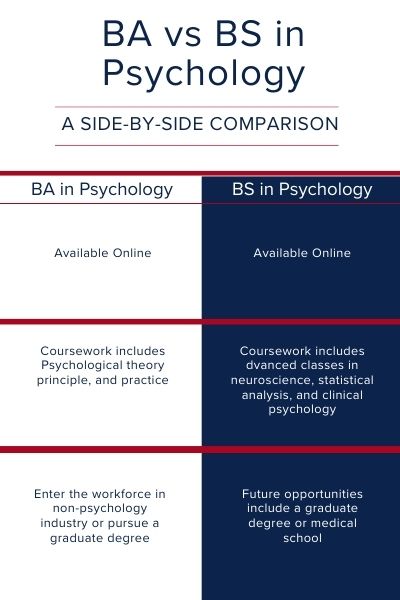One of the earliest questions you’ll face when choosing your bachelor’s degree program is whether or not to earn a bachelor of arts or a bachelor of science. The question can be especially tricky for psychology majors, as both programs offer a foundation of psychology knowledge. However, the curriculum and coursework in each program prepare you for totally different outcomes.
“Degree programs differ from institution to institution, but a lot of times the broad differences have to do with the fact that a BS is more of a mathematical, research-focused, science-focused degree,” explains Dr. Michelle Rosser-Majors, Professor and an Assistant Dean in the College of Arts and Sciences in the College of Arts and Sciences at the University of Arizona Global Campus (UAGC). “A BA is more holistic and covers the different areas of psychology.”
As psychology has become one of the most popular degree fields of study for bachelor’s students, understanding the differences between a BA vs BS in psychology and recognizing which one is best for you is critical to your success – even before you begin your first class.
What Is a BA in Psychology?
The Bachelor of Arts in Psychology became popular largely because of its versatility. The program not only introduces you to psychological concepts and theories – showing you how they can be applied in many different industries – but it also includes a foundational liberal arts curriculum.
This diversity in course content allows graduates to develop an understanding of the professional world beyond the core psychology courses. Though the curriculum varies depending on your school, some of the non-psychology courses you might find in a bachelor’s in psychology program include:
- English Composition
- Interpersonal Communication
- Statistical Literacy
- Cultural Anthropology
- Digital Literacy
- Ethics and Moral Reasoning
These courses may make up the bulk of your first two years in a four-year bachelor’s program, with your core psychology courses coming later, including:
Theories of Personality
This course reviews the basic concepts and principles of the major theories of personality. It also assesses the scientific worth and validity of these theories as they relate to the development of personality. Theoretical assumptions of the importance of environment and genetics will be stressed. Students will be challenged to identify the theoretical concepts they think best describe personality development and evaluate their own personality, as it relates to the theories being presented.
Physiological Psychology
Students study the anatomy and physiology of the brain, spinal cord, peripheral nervous system, and endocrine system. Study of the biological systems promotes a better understanding of mind-body relationships important to hunger, thirst, sex, sleep, emotion, learning, and memory. Students also examine medical theories, assessments, and treatments of psychological disorders including new imaging technologies and drug therapy.
Abnormal Psychology
The course entails a study of the diagnosis, causes, treatment, and prevention of psychological disorders. Problems with the reliability and validity of the American Psychiatric Association system for diagnosing psychological disorders will be discussed and various alternative systems will be introduced.
Statistics for the Behavioral and Social Sciences
Descriptive and inferential statistics are investigated and multiple techniques for statistical analysis are introduced in this course. Formulas for presenting and evaluating data are explored in accordance with generally accepted protocol for statistical analysis.
Lifespan Development
This course provides a basic introduction to the nature of human growth and development from conception through death. Students are provided the opportunity to explore the physical, psychosocial, and cognitive factors of growth and development from both a theoretical and a practical perspective. The context and impact of the family and society as well as individual, cultural, moral, and linguistic differences on development will be covered.
“The more holistic approach to the psychology degree is geared toward students that are still developing the idea of what their careers will look like,” explains Dr. Rosser-Majors. “Many times, the curriculum is also shaped by the goals and values of the institution.”
That’s an important distinction, especially if you’re trying to decide whether to apply your bachelor’s degree in a non-clinical or research-focused field.
What Makes an Ideal BA in Psychology Student?
According to Dr. Rosser-Majors, Bachelor of Arts in Psychology students are most likely to choose their degree because of a desire to positively impact the communities in which they live and work. Oftentimes, a psychology student is someone interested in understanding how human behavior affects our day-to-day lives. In many cases, it is someone who wants to develop an understanding they can apply to different careers or, if they’re in business, for example, they want to know more about their customers, Dr. Rosser-Majors explains.
What Is a BS in Psychology?
Much of the foundational curriculum in a BS in psychology program can be similar to that found in a BA in psychology program, depending on the university. But the biggest difference between a BS vs a BA in psychology is that a Bachelor of Science in Psychology is designed for students who have a greater interest in a research-related career. Students in a BS program will likely take more applied statistics and research methods courses, Dr. Rosser-Majors explains, and will conduct a larger research project as a capstone course.
“In a BS, you are very focused on doing research in psychology, much more on the analytical side, and often that’s because BS students might be pursuing their license,” she says.
What Makes an Ideal BS in Psychology Student?
Bottom line: if you’re passionate about science and research, you may be more inclined to pursue a BS in psychology, and you will likely want to pursue your BS in psychology at a research university.
Dr. Rosser-Majors adds, however; BA students can gain more research experience if they continue on to a Master of Arts in Psychology. The latter is fully comprised of advanced psychology courses, including developmental, social, and counseling psychology; and students will learn how to evaluate the scientific merit of psychological research and literature.
What Is a BS in Psychology?
Much of the foundational curriculum in a BS in psychology program can be similar to that found in a BA in psychology program, depending on the university. But the biggest difference between a BS vs a BA in psychology is that a Bachelor of Science in Psychology is designed for students who have a greater interest in a research-related career. Students in a BS program will likely take more applied statistics and research methods courses, Dr. Rosser-Majors explains, and will conduct a larger research project as a capstone course.
“In a BS, you are very focused on doing research in psychology, much more on the analytical side, and often that’s because BS students might be pursuing their license,” she says.
What Makes an Ideal BS in Psychology Student?
Bottom line: if you’re passionate about science and research, you may be more inclined to pursue a BS in psychology, and you will likely want to pursue your BS in psychology at a research university.
Dr. Rosser-Majors adds, however; BA students can gain more research experience if they continue on to a Master of Arts in Psychology. The latter is fully comprised of advanced psychology courses, including developmental, social, and counseling psychology; and students will learn how to evaluate the scientific merit of psychological research and literature.
Similarities and Differences Between a BS and BA in Psychology

What Career Options Come with a Psychology Degree?
A psychology degree can take your career in many different directions. The Bachelor of Arts, particularly, can be applied to a wide variety of career opportunities, including:
- Case Manager
- Family Resource Coordinator
- Youth Services Specialist
- Community and Social Service Specialists
- Research Assistant
- Store Manager
- Human Services
- Education
- Business
The U.S. Bureau of Labor Statistics (BLS), the agency that analyzes and reports employment data, also offers a glimpse into the top-employing occupations for workers with a psychology degree.
Interested in making psychology your career? If you’d like to begin your journey to a rewarding, sustainable career, talk to a UAGC advisor about your online psychology degree today.
Written by University Staff
--
The University of Arizona Global Campus does not offer a Bachelor of Science in Psychology degree program.
Successful completion of the Bachelor of Arts in Psychology degree at the University of Arizona Global Campus by itself does not lead to licensure or certification in any state, regardless of concentration or specialization. The Bachelor of Arts in Psychology is not a licensure program and does not prepare an individual to become a licensed psychology professional. Further, UAGC does not guarantee that any professional organization will accept a graduate's application to sit for any exam for the purpose of professional certification. Students seeking licensure or certification in a particular profession are strongly encouraged to carefully research the requirements prior to enrollment. Requirements may vary by state. Further, a criminal record may prevent an applicant from obtaining licensure, certification, or employment in this field of study.
Certain degree programs may not be available in all states.
